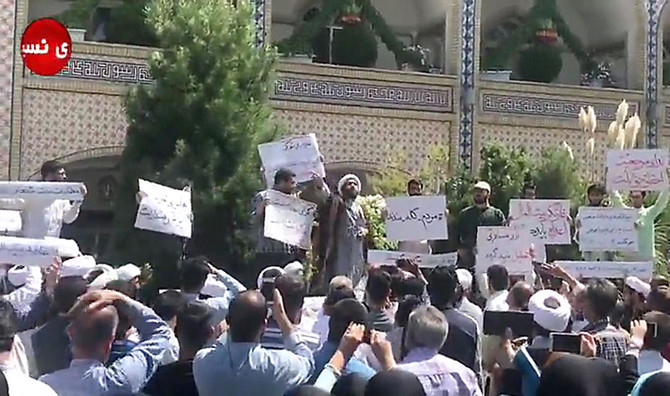
In this video grab made from a video by Nasim News Agency, a cleric speaks to a crowd of protesters demonstrating in Mashhad, in the Khorasan Razavi province, on August 3, 2018. (AFP).
- About 500 protesters attacked a seminary in the northern province of Alborz
- Protests have rocked major cities across Iran amid mounting anger over the country’s economy and political system
LONDON: A religious school was attacked in Iran late Friday as public protests spread, in an uprising one policy expert said would continue “until the regime falls.”
Iran’s semi-official Tasnim news agency said Saturday that about 500 protesters attacked a seminary in the northern province of Alborz, hurling stones and leading to several arrests.
Protests have rocked major cities across Iran — including Tehran, Isfahan, Shiraz and Mashhad — amid mounting anger over the country’s economy and political system.
Alireza Nader, chair of the Anti-Defamation League’s Iran Task Force and former policy analyst at the RAND Corporation, said the Iranian government was unlikely to listen to calls made by the protesters.
“Iran is experiencing a nationwide uprising which won’t end until the regime falls or makes fundamental reforms. History shows it won’t pursue the latter,” Nader told Arab News.
“Iranians simply have had enough of the misery inflicted on them over the past 40 years. The regime could resort to major violence, but that’s likely to create an even bigger rebellion.”
Videos shared on social media in recent days have shown crowds of protesters in several cities, chanting slogans such as “death to the dictator” and those demanding an end to Iran’s regional interventions in Lebanon, Syria and Yemen.
In the city of Mashhad, a cleric was seen in a video telling a sizeable crowd that “most of your representatives don’t care about people’s problems,” according to Qom News.
Nader said that the protests amount to the “most widespread anti-regime resistance movement” since the 1979 revolution in which Iran’s shah was overthrown.
The current protests follow unrest in December and January, when at least 25 people were killed in demonstrations that spread to dozens of towns and cities.
They come ahead of a new wave of US sanctions on Iran, the first phase of which will be introduced Tuesday, and involve blocks on financial transactions and imports of raw materials among other measures.
Source: http://www.arabnews.com/node/1351246/middle-east
[Disclaimer]








